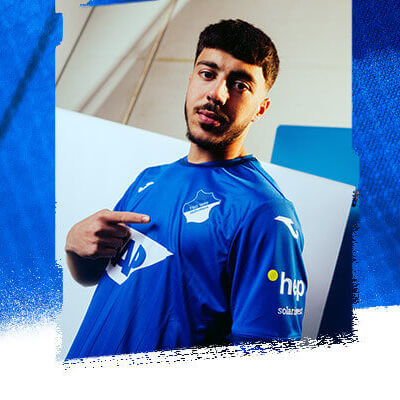A SPIELFELD for women's football
The issue of SPIELFELD published on 8 March is set to be an extraordinary one. For the first time, the TSG monthly magazine is entirely dedicated to women's football. TSG patron Dietmar Hopp makes his position clear in the foreword: "Of course, we won't be solving any problems with this magazine, but perhaps by publishing it we will be drawing attention to the challenges and opportunities that await us when it comes to equal rights."
In an in-depth interview, TSG professionals Fabienne Dongus and Anton Stach openly discuss the differences between men's and women's football as well as sensitive topics such as pregnancy in football, the female menstrual cycle, homosexuality and equal pay. The TSG captain has a clear opinion on this: "Personally, I think there's too much money in football as a whole. That's the biggest problem, as it's a sport that almost everyone in our country likes to watch or play. Earnings are causally linked to attention and visibility. And accordingly, I would never demand that we should get the same salaries. Where should the money come from? You have to think economically." Anton Stach comments on the idea of the male Bundesliga professionals paying a kind of solidarity surcharge to their female colleagues: "That's an interesting idea that would certainly make a big difference and would also send a strong signal to the outside world." Nevertheless, Fabienne Dongus makes it clear: "We don't want charity, we want to continue to grow, welcome more fans and justify our salaries."
The two TSG pros acknowledge that they are in very different situations when it comes to family planning. "It's hard to reconcile with football, which is still our purpose in life. Fortunately, the age limits have shifted a little, but in the past almost all players who wanted to become mothers ended their careers at the age of 30 at the latest - without having any financial security, of course. At 25, hardly anyone thinks about having a child anymore, because you're getting to your prime years for football," says Fabienne Dongus. Anton Stach comments: "It would definitely be an important and positive step to provide players with better support when it comes to pregnancy and allow them to reach an easier decision. In the best case scenario, of course, the salary should be guaranteed by the clubs for the duration. I have a lot of respect for the fact that women in football have to make this really difficult decision."
While the subject of homosexuality is "completely normal" in women's football, according to Dongus, it is still a taboo subject for men. "I can imagine that the publicity in the media and the possible behaviour in the dressing room will prevent someone from coming out. The fear of being ostracised is certainly very great," says the 29-year-old. Anton Stach agrees: "I subscribe to that exactly. I also believe that many footballers are afraid of being ostracised - even though society in general has become much more open. But being the first is a completely different step - although the LGBTQ movement has already achieved a lot and there would be a lot of people who would support the player. But it would still be a very brave decision to go public with it. And, of course, it would involve a media presence that takes energy and also distracts from the sport."
The magazine is not only dedicated to women's football from the TSG cosmos. Katja Kraus from 'FUSSBALL KANN MEHR' (football can do more) talks about the current challenges in the context of diversity and parity in professional football. Player consultant Jörg Neblung leaves no doubt that, despite all the growth, women's football would benefit from a little realism. Other content includes a guest article by Doris Fitschen, overall coordinator for women in football at the DFB, as well as a portrait of Jennifer Kettemann, who has managed the Rhein-Neckar Löwen handball club for eight years.
It's set to be a very special issue of SPIELFELD - the full 120-page magazine will be published on 8 March.





















